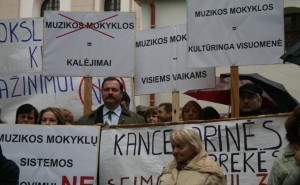
Teachers' unions say the goal of Thursday's protest is to prod the education ministry into opening a dialogue about the budget cuts. Photo by Nathan Greenhalgh.
VILNIUS — From Poles to policemen to pensioners, Lithuania’s capital city was inundated with protests Thursday.
The labor unions of various public-sector employees held four different protests in Vilnius decrying the budget cuts the Lithuanian government is implementing. Meanwhile pensioners irate about cut benefits and Polish speakers concerned about the marginalization of their language and discriminatory property restitution were also out in force.
At the ministries of culture, education, interior affairs and health crowds of roughly 100 union members gathered despite the cold wind and steady rain to carry placards and listen to speeches. Although the specific grievances of each union differed, they all revolved around the austerity measures the Lithuanian government is taking to keep its budget deficit from reaching unmanageable levels in light of declining tax revenue due to the financial crisis. Public sector wages were already cut by 12 percent in December as part of the center-right coalition’s anti-crisis plan.
“The groups of the citizens, they were going with their own demands, their own requests,” Vytautas Bakas, vice president of the National Association of Officers’ Trade Unions, told Baltic Reports. “But yes, all those groups were protesting because the Lithuanian government is taking not right measures to combat the financial crisis. Instead of … reducing the income for people, they should reduce the costs of governing first.”
Bakas’ union represents police and border guards, who gathered at the Ministry of the Interior at noon.
“In any European Union country, the cut for the Lithuanian police were the biggest,” Bakas said, adding that not only were wages being lowered but also operational expenses that threatened the country’s border security.
“It can appear a problem to fulfill the commitments of Schengen because not only the wages are reduced but also the fuel and things that directly affect the quality of the work,” Bakas said.
Outside the Ministry of Education, teachers’ union members were saying similar things about their work conditions.
“Our wages are going down, the government says eight percent,” Jūratė Petkevičienė, a secondary school English teacher, told Baltic Reports.
Participating unions said the goal of the protests is to kick-start a dialogue with the government about the efficacy of the wage cuts or layoffs.
“We are expecting that our minister will listen to them and start a dialogue,” Aldona Kindurienė, vice president of the Christian Trade Union of Education Workers, told Baltic Reports. “Before that we were trying to talk, but the ministry didn’t want to. The education minister wasn’t taking any responsibility.”
However, no branch of government has agreed to a policy change in light of the protests.
Complicated Lithuanian-Polish history surfaces
One group of protesters differed from the rest. The crowd of roughly 100 Polish speakers standing in front of the Swedish Embassy in Vilnius were not concerned about ministry budget cuts but instead the blockage of using Polish street names and the restoration of Soviet-confiscated property that the Union of Poles in Lithuania political party argues unfairly awarded more property to Lithuanians. Before WWII Vilnius was a provincial Polish city, not the seat of Lithuanian power.
Sweden currently holds the rotating EU Presidency. The union hopes to get the EU’s attention to help combat what placards at the protest called “ethnic discrimination.”
Today’s series of protests was the largest-scale labor action Lithuania has seen since the Jan. 17 Seimas riots. Unlike that protest, no incidences of violence or illegal activity were reported Thursday.












